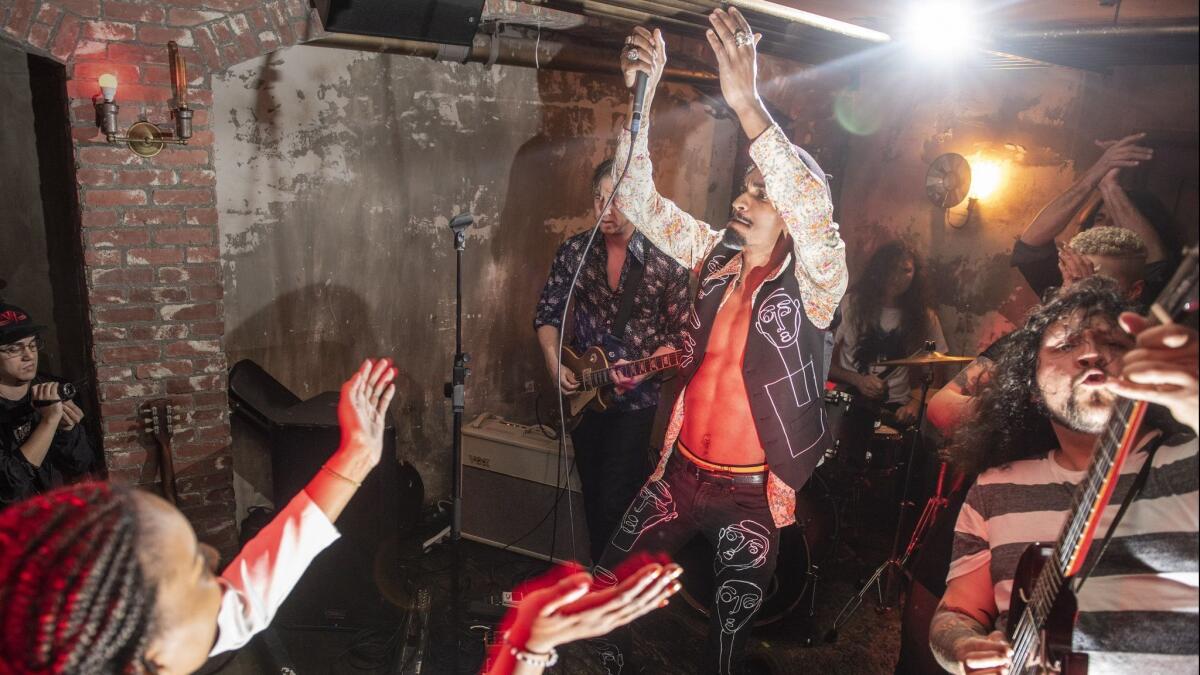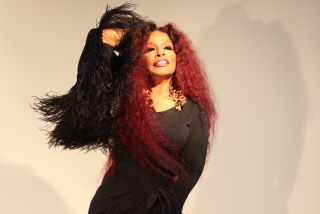Guitarist Pete Wilde wants to ‘be music the way Prince was’

- Share via
On the inside of his left wrist, Pete Wilde has a tattoo of Prince’s eternal logo. He’s probably not the only guitarist in Echo Park with a similar bit of ink, but he’s got a better claim to the symbol than most.
Wilde’s stepfather, Eddie Mininfield, was Prince’s saxophonist throughout much of the ‘80s and ‘90s. His childhood memory of watching them perform onstage (along with “Auntie Sheila,” as in Sheila E.) were his formative examples of rock’s magic.
“Seeing my dad play with him was different than with any other musician,” Wilde said. “I’ll never be as good as Prince was, but I want to walk offstage completely drained because I gave everything. I want to be music the way Prince was, because everything he did was music.”
Prince’s shadow in Wilde’s life was also a reminder of the long, intertwined history of black culture and rock and roll. On his debut solo record “Sugar & Smoke,” out Friday, Wilde makes a case for its vitality in a world dominated by hip-hop (which, to be sure, he also adores).
The album tackles police violence, self-destructive clubbing and emotional co-dependency — popular topics on today’s rap and R&B playlists. But the heavy riffs, desperate falsetto and thick funk bass feel timeless. “Sugar” could sound right at home spilling out of the windows of a weed-fumigated ’70s El Camino, a ’90s Chevy Impala on Crenshaw Boulevard or a 2010 festival stage.
“I’ve loved rock and roll my entire life, but over the last few years as rock was dethroned by hip-hop as the most popular genre in America, there’s been a lot of talk about ‘where should rock go, rock is dying,’ ” Wilde said. “These conversations shouldn’t be had without inclusion of the culture that birthed rock.”

Walking into Echo Park’s Bar Calo for a late-night interview last week, it was clear who the nascent rocker in the room was. Wilde, tall and wiry, has a front tooth missing and wore about a dozen vintage metal rings, with an upended black beret carrying a whiff of ’60s militancy.
True to his lineage, he’s an encyclopedia of rock lore (his eyes lit up talking about Sister Rosetta Tharpe’s guitar playing). But a rough adolescence in East Oakland almost derailed him. Just when Wilde was getting his bearings as a songwriter, he served a three-month stint in jail for a crime whose details he didn’t want to get into (“I did something really bad, something I never thought I’d do”), but whose revelations he certainly did.
“In jail you don’t have anything to do but read and do push-ups, so I read a lot and learned a lot,” he said. “I’ve always been pretty aware, with a firsthand account, that our justice system is broken, and it’s gonna take more than nice songs to change it. It’s gonna take action and legislation, and hopefully one day my music makes enough of an impact where I can sit down with someone who does make change and bend their ear.”
On “Say My Name,” the record’s emotional core, Wilde demands we remember victims of state-sanctioned police violence, and its hooks drip with soul music’s incandescent pain. It’s striking to hear coming from a genre so fetishized by the boomer power brokers that Wilde’s peers are protesting against. The song’s DNA runs back through Public Enemy, Sam Cooke and beyond, but it’s very of this moment.
“Sugar” isn’t overly preachy though. “Lucy” is redlining Delta blues, sauced up for modern heavy rock fans; “Steady Lover” glides on Gap Band synth bass and guitar tones from David Bowie’s “China Girl.” He’s assembled a crackling band to flesh out the arrangements (especially the Aussie-transplant metal drummer Harry Thynne, who hits hard enough to carry these songs twice over).
But he’s also feeling his way through a confusing modern musical climate, where changing ideas about representation and stereotypes refract in frustrating ways for him.
“I’m really into Bruno Mars and I never really understood that backlash,” he said about Mars’ 2018 Grammy sweep that, detractors say, went to a competent but anodyne LP. “He acknowledged where the music comes from, that there’s no American music without black music. His dad’s Afro-Latino and his mom is Filipina, and he’s making the music he loves and does it well. I don’t know what more you want from artists.”
Wilde feels race still makes him an outsider in his genre as he aspires to mainstream attention. He recounted pitching “Lucy” for a prominent rock playlist on a major streaming service, only to be told that “it wasn’t rock because it wasn’t like Imagine Dragons. We have to start questioning what creates these boxes, because it’s musical segregation.”
But when a multi-city festival like Afropunk can re-frame almost any genre to show its black DNA, and a meteoric rapper like Lil Nas X samples American cowboy music that predates even the blues, Wilde has faith that the old virtues still apply.
“After I released ‘Lucy,’ a black woman messaged me on Instagram and was like, ‘You’re making rock and roll that sounds like our roots, the things we grew up listening to’,” Wilde said. “She said, ‘It sounds like the music we make, but with loud guitars. It’s got a fat, funky bass line and R&B lyrics and falsetto all over it.’ And that’s just what I wanted to hear.”
For breaking music news, follow @augustbrown on Twitter.
More to Read
The biggest entertainment stories
Get our big stories about Hollywood, film, television, music, arts, culture and more right in your inbox as soon as they publish.
You may occasionally receive promotional content from the Los Angeles Times.










